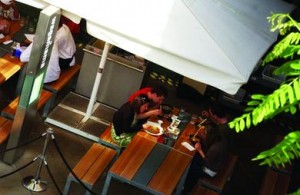
Over the course of the last 12 months, private equity firms of varying sizes have been snapping up eateries all over the UK.
Over €300bn is spent on eating out in Europe, a record amount, according to research by restaurant consultancy firm
When Graphite first invested in 1996, the company had just two restaurants. When
Gaucho Grill has only been in Phoenix’s portfolio for 14 months but already is looking towards an IPO to cash in on recent investor appetite for UK eateries. Gaucho is looking at a market valuation of £100m and is expecting to raise £50m for itself, with Phoenix’s 45% stake reported to be worth £25m. When Phoenix took over, the chain had a total of nine restaurants in its estate – this has now expanded to 11, with plans to open three more stores in 2008, including a prime site at the O2 arena (formerly known as the Millennium Dome). In the long-term, it plans to open a further 40 new sites, including mainland Europe where it already has a restaurant in Amsterdam.
“Roll-out stories are attractive for investors,” says Hugh Lenon, managing partner at Phoenix. “What we are doing is proving an operating model works and then rolling it out geographically, and this is what makes Gaucho and Wagamama attractive to investors, not just on the public markets but for private equity as well. What’s changed in recent years is these businesses are being run by high-quality management teams whereas perhaps they weren’t a few years ago. They are ready to graduate to the public market.”
Such success is not industry-wide. Backman says that despite media reports, the restaurant sector is not experiencing rapid growth but a more modest 2% above inflation after a period in 2001 to 2003 when the market dipped. It’s a market where consumers have become very price sensitive, and very conscious of being time poor. “Eating out has got to take its place alongside any other leisure activity,” explains Backman.
In response to this, UK restaurant prices have remained somewhat static, and there has been a drive towards cheaper eating. This has made it a very competitive market, prompting the question as to why public and private investors are so interested in it.
“There are some very good players out there”, says Backman. “Wagamama, for example, know what they are doing. They are able to cream off the not-so-good players.”
There is also the property angle which can appeal, although this is more applicable to pub chains than dedicated restaurants, and thirdly there is the ease of setting up a restaurant business. “No matter how badly you run a food service, you are going to have positive cash flow,” says Backman.
The turnaround of the sector as a destination for investment has been dramatic. As Lenon says: “Ten years ago it was very unusual to invest in a restaurant business, but now it’s definitely changed. Blackstone is now an investor in the sector with Tragus, something which you would not have thought a decade ago.”


 If you do not receive this within five minutes, please try and sign in again. If the problem persists, please
email:
If you do not receive this within five minutes, please try and sign in again. If the problem persists, please
email: